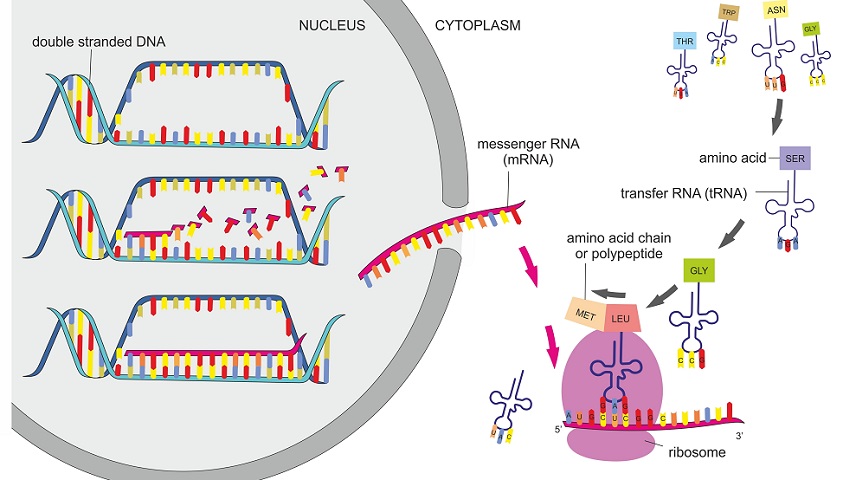Explain Why Cells Synthesize Different Types of Proteins.
Proteins are one of the three__ found in the diet and important structural molecules in living organisms. It is regulated by different proteins and depends on which proteins your body needs in which cells.
5 7 Protein Synthesis Human Biology
Transcription is happening throughout your body all of the time but not every gene is constantly being transcribed in every cell.

. Gene Expression Can Be Regulated at Many of the Steps in the Pathway from DNA to RNA to Protein. These proteins are used in different biochemical reactions act as a catalyst and used for structural purposes. These amino acids help synthesize the different types of proteins required by the body.
Since our body cannot synthesize these essential amino acids by its own we should have plenty of protein foods in our everyday diet to keep our body metabolisms stable. While all macronutrients share similarities proteins are different than both carbohydrates and lipids in important ways. We review their content and use your feedback to keep the quality high.
Proteins help provide structure to cells and are the major component of enzymes that participate in biological reactions. The eukaryotic mRNAs do not have a purine-rich sequence ribosome binding sequence on the 5 end. Why do cells synthesize different types of proteins.
The initiating codon is eukaryotes is also AUG. Explain why cells synthesize different types of proteins. Based on the molecular shape proteins can be classified into two types.
A few genes produce regulatory molecules that help the cell assemble proteins The journey from gene to protein is complex and tightly controlled within each cell. Who are the experts. The AUG nearest to the 5 end of the mRNA is usually selected as the start site.
Different nucleotide sequence in the different alleles of a gene different nucleotide sequence in messenger RNA mRNA transcription different amino acid sequence in a protein translation different structure and function of the protein eg. When the polypeptide chains run parallel and are held together by hydrogen and disulfide bonds then the fiber-like structure is formed. The making of the various types of protein is one of the most important events for a cell because protein not only forms structural components of the cell it also composes the enzymes that catalyze the production of the remaining organic biomolecules necessary for life.
Numerous cellular activities in the cell need proteins in prokaryotic and eukaryotic cells. A Cell Can Change the Expression of Its Genes in Response to External Signals. Experts are tested by Chegg as specialists in their subject area.
From the amount of protein you should be consuming to the different types of plant and animal proteins to the new buzz around alternative proteins there is a lot to take in and we are often left with more questions than answers. The process of protein production involves two steps. Protein is a hot topic in medical and wellness news today.
Different Cell Types Synthesize Different Sets of Proteins. This problem has been solved. Enzyme that unwinds DNA and then adds new nucleotides to a growing strand of RNA for the transcription phase of protein synthesis.
The Different Cell Types of a Multicellular Organism Contain the Same DNA. It consists of two major steps. Deoxyribonucleic acid DNA carries the sequence of coded instructions for the synthesis of proteins which are transcribed into ribonucleic acid RNA to be further translated into actual proteins.
Defective enzyme different characteristics. Such proteins are generally insoluble in water. Eukaryotic protein synthesis involves more protein components and some steps are more complex.
Full complement of proteins produced by a cell determined by the cells specific gene expression ribosomal RNA rRNA RNA that makes up the subunits of a ribosome. The Buzz Around Protein. These are water-insoluble proteins.
Different alleles can result in different characteristics as follows. Cells can synthesize specific proteins because the sequence of nucleotide bases in the DNA of genes specifies a particular sequence of amino acid building blocks of a. Proteins are composed of amino acids arranged into different groups.
By regulation we mean that certain proteins are needed for transcription to start and some proteins can even prevent transcription from happening. These fundamental amino acids sequences are specific and its arrangements are controlled by the DNA. Explain why cells synthesize different types of proteins.
In tissues such as skeletal muscle where the predominant cell type is postmitotic skeletal muscle fibers growth is accompanied by DNA synthesis in supportive cells. However there are certain factors transcription factors and cellular conditions within a cell that dictate which proteins are produced. According to the function and role that proteins play in our body they are classified into different types.
Because many identical RNA copies can be made from the same gene and each RNA molecule can direct the synthesis of many identical protein molecules cells can synthesize a large amount of protein rapidly when necessary. Each cell will indeed have the same DNA sequences and ability to produce any given protein. Transcription occurs in the cell nucleus and uses the base sequence of DNA to produce mRNA.
The set of amino acids that make up a protein determine its functioning in the body. The synthesis of proteins occurs in two sequential steps. The mechanism of protein synthesis is different in prokaryotic and eukaryotic organisms.
DNA and RNA are nucleic acids found in the cells of living organisms. If the conditions are right then only certain proteins will be produced depending on what type of cell it is. To explain when cells proliferate protein mass is doubled in the growth phases so that two daughter cells have the full complement of genetic material and protein machinery 30.
Most genes contain the information needed to make functional molecules called proteins.

Protein Synthesis An Overview Sciencedirect Topics


Comments
Post a Comment